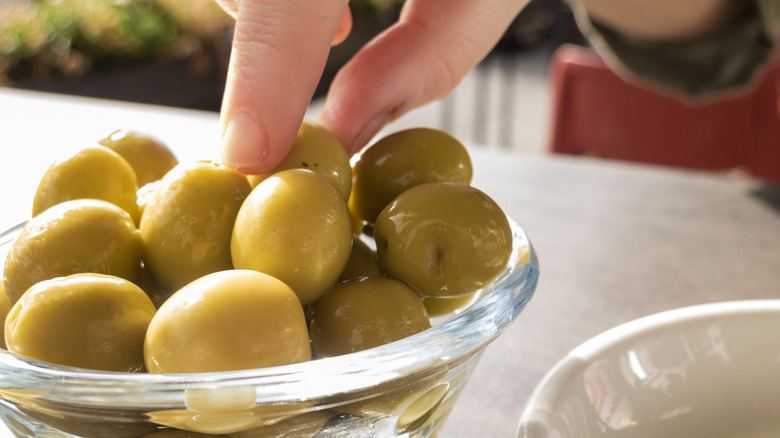The Salty Snack That Can Actually Help You Lose Weight
Salt is a seasoning that usually gets a bad rap. Although sodium is needed by your body for the regulation of bodily fluids and muscle and nerve function, too much of it is linked to heart disease, excessive thirst, headaches, high blood pressure, kidney disease, osteoporosis, stomach cancer, and stroke.
If you're trying to lose weight, salt is one ingredient healthcare professionals will ask you to be mindful of. This is because excess salt intake can lead to both temporary and long-term weight gain. It's temporary because too much sodium causes your body to retain fluids; it's long-term because many of the salty treats we turn to — like fried foods, potato chips, fast food, processed meats, and frozen dinners — are also high in calories.
But there just might be good news yet for those out there with a salty tooth who are also trying to shed some pounds. Olives — the salty and tangy fruit that goes in pizza toppings, charcuterie boards, tapenades, and martinis — can be useful in your quest to lose weight. Apart from being one of the most celebrated ingredients in a Mediterranean diet, which is often associated with weight loss, olives contain other nutritional properties that make them an ideal snack for weight loss.
How salty olives help you lose weight
Olives are packed full of a lot of essential nutrients, like monounsaturated fats (one type of healthy fat), fiber, vitamin E, and antioxidants.
The healthy fats and fiber content, in particular, can help you feel full for longer because they take longer to digest. "Olives do what you want a snack to do: They're good for your health and keep hunger at bay until your next meal," explained registered dietitian Devon Peart (via Cleveland Clinic).
Plus, according to a 2015 randomized, controlled, and single-blind study involving 32 women and spanning 60 days, published in Diabetology & Metabolic Syndrome, a diet high in monounsaturated fats was linked with up to 4.2 pounds of weight loss and lower fat mass, body mass index (BMI), and waist circumference. An older 2008 study done on individuals with type 2 diabetes had similar results (per Diabetes Care).
Olives are also considered to have a low calorie density, with a rating of 1–1.5 for whole black or green olives. However, the total calories in olives differ with the type of olives you consume.
While the vitamin E content in this small fruit hasn't been directly linked to weight loss, a 2017 study published in Frontiers in Pharmacology found that vitamin E can improve inflammatory status and insulin resistance in obese patients, two health concerns that are closely related to metabolic syndrome. There are, however, some things to consider before consuming this healthy snack to lose weight.
Things to know when consuming olives for weight loss
As we noted before, there are different kinds of this salty fruit. Some examples include the Kalamata olive from Greece, the Castelvetrano from Italy, and the more common American olive. The hue of olives — green, black, or purple — is a sign of when they were picked from the tree, otherwise known as their ripeness at the time of harvesting, and also the kind of curing method that was used. Green olives are said to contain the most amount of antioxidants, and since they're harvested quite early on, they also contain the lowest amount of calories.
Even so, how the fruit is cured can change its calorie content. You're going to want to be mindful of just how much salt is in them and how much you're consuming at a time. The calorie count can increase if you don't pay attention to portion size and eat too many olives. Experts would tell you to stop at a handful, more specifically, 5-10 olives, per day. You may also want to avoid the canned variety for their excess sodium and calorie content, added nutritionist Swati Kapoor (via Practo).
If you don't like snacking on them, you can include them in your recipes as we mentioned before. Pizza, salads, breakfast foods, and chicken dinners can all be made better with some olives in them.



